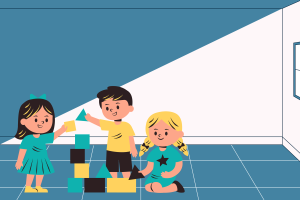
Montessori education is a method of teaching children based on the philosophy that children learn best when they are engaged in activities that are natural to them. This means that formal teaching methods are avoided, and children are encouraged to use their natural curiosity and interests to learn. The Montessori classroom focuses on developing hands-on, real-world skills, and the materials are designed to promote these natural interests.
Curriculum
The Montessori education system has a unique curriculum that is different than traditional classrooms. The materials are highly structured and arranged in a hierarchical order. They are also connected in complex ways. No other educational system comes close to this. The Montessori curriculum is a good fit for families who want to provide their children with a Montessori education.
The Montessori curriculum is organized around the four areas of the child’s life, and includes all aspects of pre-reading, writing, and mathematics skills. In addition, Montessori classrooms emphasize cultural awareness and develop an appreciation for life. Children in a Montessori classroom look forward to their next lesson and learn to love learning.
Materials
Montessori education materials encourage children to interact with their surroundings and to engage in active learning. The use of manipulatives, such as checkerboards and cubes, helps them develop mathematical skills, including addition and subtraction. The materials are made of a wide variety of materials, including beads and rods.
These materials are made from sustainable, natural materials, and are designed to meet the individual needs of children. They are also offered in sequence, which promotes a gradual layering of knowledge and skills.
Limits
Limits are an integral part of Montessori education. They provide structure, routine, and reliability to the child’s environment. In addition, limits help children develop a sense of independence, self-confidence, and respect. Montessori teachers encourage children to explore the limits of their environment. The child is never forced to do something he doesn’t enjoy, and he may even seek out activities that he doesn’t enjoy.
The limits of Montessori education are rooted in the idea that increased freedom brings increasing responsibility. This idea is a fundamental one that underlies a functional society. For instance, as an adult, you have the right to drive a car but you also have to follow traffic rules and maintain a car. In the same way, the child in a Montessori classroom has the freedom to choose his own work, but he also must respect the rights of others.
Independence
Independence is an important developmental skill for children of all ages and is a central focus of Montessori education. It is an organic process that helps children become confident individuals. The benefits of independence extend throughout a child’s life. Montessori parents are encouraged to foster this independence in their children. Here are some ways to foster independence in your child at home.
First, independence allows children to evaluate and make decisions for themselves. Second, children are able to control their own mistakes and seek mastery. Independence builds confidence and develops self-esteem. This is especially important during childhood, when children are forming their own personalities.
Connections
Connecting with parents is a critical part of the Montessori education process. It helps children learn to be confident, self-directed citizens, who think critically and work collaboratively. They also develop respect and responsibility. In the process, they become self-reliant, creative, and independent. Here are a few ways to make connections with parents.
In the Montessori environment, children are encouraged to ask questions. In this way, they can acquire new knowledge easily.
Time in class
Children spend most of their time in class working in small groups or working independently. There are up to 20 different activities going on at one time, and children are given time to complete each one. In this way, children develop concentration, cooperation, independence, and a love of exploration. Montessori classrooms encourage the child’s natural curiosity, allowing him or her to explore a wide variety of objects and activities.
Montessori classrooms also place an emphasis on individual progress, as children are given the opportunity to work on specific skills over long periods of time. Each activity is based on a child’s interests, and teachers observe children as they engage in activities for various periods of time.
Day Nurseries That Provide Montessori Education
Little Tigers Day Nursery in Park Royal is an excellent place for childcare for babies and young children. The nursery is purpose-built and has been designed to meet the needs of all different age groups. It also has an excellent outdoor area to encourage play. The aim of the nursery is to create a home away from home for your child as well as providing a high quality education.




